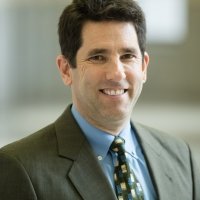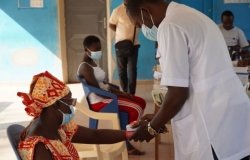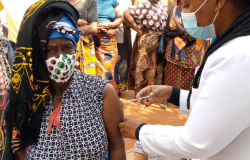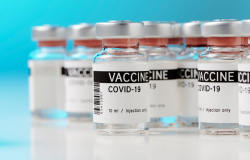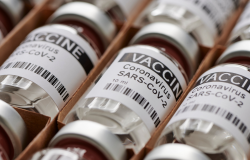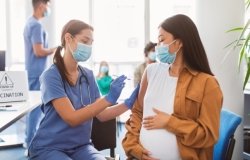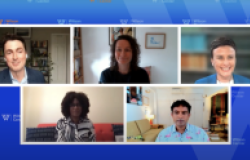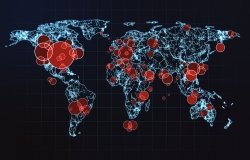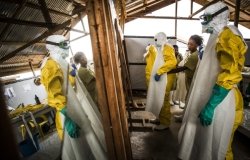"COVID-19 CORONAVIRUS particle Computer Generated" by Felipe Esquivel Reed (CC BY-SA 4.0)
WEBCAST | COVID-19 and Africa: On-the-Ground Perspectives from Five African Countries
On April 9, 2020, the Wilson Center Africa Program hosted the event "COVID-19 and Africa: On-the-Ground Perspectives from Five African Countries."
Overview
On April 9, 2020, the Wilson Center Africa Program hosted the event "COVID-19 and Africa: On-the-Ground Perspectives from Five African Countries." Congresswoman Jane Harman, Director, President, and CEO of the Wilson Center gave introductory remarks and Mr. Michael Morrow, Senior Diplomatic Fellow moderated the event. The event featured five directors from the Southern Voices Network for Peacebuilding: Dr. Yonas Adaye Adeto, Executive Director of the Institute for Peace and Security Studies (IPSS) in Ethiopia; Mr. Anas El Gomati, Founder and Director of the Sadeq Institute in Libya; Rev. Eugene Goussikindey, Director General of the Centre de Recherche et d'Action pour la Paix (CERAP) in Côte d'Ivoire; Prof. Cheryl Hendricks, Executive Director of the African Institute of South Africa at the Human Sciences Research Council; and Fr. Alain Nzadi-a-Nzadi, Director of the Centre d'Etudes pour l'Action Sociale (CEPAS) in the Democratic Republic of the Congo. This event provided a better and more in-depth understanding of COVID-19's unfolding in Africa, in general, and in particular African countries.
Dr. Adeto began the discussion with the situation and challenges facing Ethiopia due to the coronavirus. Economically, Ethiopia could suffer half a billion-dollar loss, especially in sectors like flower exports and Ethiopian Airlines, where the international demand has declined. He discussed how the government had supplied resources like masks and sanitizer, issued stay at home orders, and relied on community leaders to stress the importance of taking precautions. Dr. Adeto emphasized that although physically distancing, citizens have a strengthened communal bond and sense of responsibility for their neighbors. Additionally, he noted that the postponement of Ethiopian elections scheduled for August occurred after consultation with the parties, but raised concerns about the government's ability to organize and ensure fairness in the aftermath of the pandemic. Regionally, Dr. Adeto discussed how COVID-19 could exacerbate challenges facing East African countries, including insecurity and locust swarms, as it strains government resources. Regarding international cooperation, he said that African nations should welcome support from diverse foreign powers, tailor policy for the context of each state, and implement collaborative efforts to tackle the virus.
Mr. El Gomati spoke to the intersection of COVID-19 and the current conflict in Libya. Given the ongoing civil war in Libya and a recent uptick in attacks, he expressed concerns over armed groups shelling hospitals, millions of citizens cut off from water supplies, and the pressure on medical personnel to balance needs from the war and the pandemic. Recently, foreign powers put pressure on the groups to agree to a ceasefire, but as COVID-19 has spread globally, most countries are focusing on their domestic responses to the virus. Economically, the oil industry will take a hit as the pandemic progresses. While Libya has a strong public welfare system that could provide some relief to citizens, the banking system could struggle with credit and liquidity. The conflict has complicated North African regional responses to the virus as Egypt backs the rebel regime in Eastern Libya, and Tunisia works with the government in Western Libya. Furthermore, the strain on African resources created by the pandemic could increase migration to Europe, worsening the existing migration crisis.
Rev. Goussikindey provided insight into the situation in Côte d'Ivoire and West Africa broadly. In Côte d'Ivoire, the government has closed its borders, quarantined those returning from abroad, instituted a curfew, and limited travel from Abidjan into rural areas to slow the spread of the virus. The government's main challenge is communicating new measures and updates to citizens. Rev. Goussikindey discussed how although the government has created a national relief fund, it remains unclear how and by what criteria it will disperse this money to citizens. With Ivorian elections at the end of August, he was not aware of any indications of postponement, especially in light of other West African countries carrying out elections. Through the Economic Community of West African States (ECOWAS), Côte d'Ivoire has enacted a robust regional response to the virus alongside neighboring countries. ECOWAS is focused on procuring medical equipment, including tests and labs, and drawing on experience from the Ebola outbreak in 2014. Challenges for West Africa include security concerns in Côte d'Ivoire, Mali, Burkina Faso, Niger, among others, leading to an increase in internally displaced persons, further complicating COVID-19 responses.
Prof. Hendricks spoke to the situation in South Africa, which currently has the highest number of confirmed cases on the continent. However, at the time of the event, only 50,000 people out of the population of 57 million had been tested, revealing a key problem that many African countries face with access to testing. Initially, the South African medical community waited for citizens to seek testing, but they have since taken more proactive measures by deploying 10,000 practitioners to test in townships. Prof. Hendricks highlighted how COVID-19 had underscored wealth disparities throughout South Africa, especially in the divide between wealthy private hospitals and public hospitals that do not have ample resources. While Southern African countries have not offered a unified response, South Africa has worked through the efforts of the African Union. The African Union has established a solidarity fund, procured continental resources, and communicated updated statistics. Africa has always faced multiple ongoing challenges, she noted, and can respond to the pandemic amid those ongoing challenges.
Finally, Fr. Nzadi-a-Nzadi discussed COVID-19 in the Democratic Republic of the Congo (DRC), which has experienced a slow response from the government. The DRC does not currently have sufficient resources or money to reserve for relief efforts, particularly after the government recently stabilized an Ebola outbreak. The country closed its borders and required social distancing belatedly. More recently, the DRC has focused on lessening the financial strain on citizens by providing aid for water and electric bills. While economic projections for the DRC in 2020 indicated that the economy would grow by up to five percent, the impact of two outbreaks has already led to an economic decrease of two percent. As for regional cooperation, Fr. Nzadi-a-Nzadi noted that Central African countries had not enacted a strong response compared to other regions on the continent, so the DRC has primarily worked with the African Union.
The SVNP is a continent-wide network of African policy, research and academic organizations that works with the Wilson Center’s Africa Program to bring African knowledge and perspectives to U.S., African, and international policy on peacebuilding in Africa. Established in 2011 and supported by the generous financial support of the Carnegie Corporation of New York, the project provides avenues for African researchers and practitioners to engage with and exchange analyses and perspectives with U.S., African, and international policymakers in order to develop the most appropriate, cohesive, and inclusive policy frameworks and approaches to achieving sustainable peace in Africa.
Selected Quotes
Yonas Adaye Adeto
"Socially, it’s also helped the other aspect of humanity that we all have a limit. So, people started to think, to reflect back, and cooperate….So, corona not only has negative but also positive aspects of bringing people together as well. And this “social distancing” has been has been replaced in Ethiopia, “physical distancing” rather than “social distancing.” …So, we don’t say social distancing but physical distancing—socially coming together, and physically, of course, about two meters keeping away while thinking of each other, helping each other.”
“Whenever we discuss security, we see it as regional security complex. So, from that angle, it really also created another extremely important opportunity for Africa to come together in pan-African spirit.”
“This particular climate issue, we had this conference very recently [on] how extremely demanding it is…Currently, locust is hovering around the Horn of Africa, and again, that need only affect, and again this land degradation—it is compounded together and it is very difficult if not impossible for only one country to tackle. It necessitates definitely regional integration, and more than that, a global coalition.”
“Cultural differences must be celebrated; that’s my view…I think for Africa, the fine way is most of the time cooperating both ways—with west as well as east—as long as Africa’s problems can be addressed…We are very happy to work with both America, the European Union, as well as China. So, we welcome from whichever it is…The principle we have is peaceful coexistence, working with all of them, and let’s focus on that.”
“I would rather focus on the way out. I would be very happy if multilateralism was back again if we can really focus on the governance aspect in Africa. The most difficult thing for us in Africa is not economy, not even coronavirus, but governance, seriously speaking. So, if we can focus, if we can improve our political governance, economic governance, the entire governance structure, then I am sure we will be back on track.”
Anas El Gomati
“After nine years, and particularly after the last year of the conflict, the public health system in Tripoli, its most densely populated part of the country, is really in dire need. That’s the first thing that really comes out at a time like this. The first of those that fell in the war in the last year had been paramedics, had been public health officials, had been those that are working on the front lines trying to save people from the war, and that capacity is now lacking.”
“It seems like the cover of coronavirus and the fact that there was a global distraction by the coronavirus is actually intensifying the conflict in Libya. That’s really the damage we’re looking at today…It seems like one of the belligerents the Libyan Arab Armed Forces are allowing themselves to kind of become excessive and to intensify their attacks on the very infrastructure that would save people from the coronavirus, or at least treat people that has coronavirus.”
“We should be under no illusions; this will rip through Libya’s population in a way we have never seen before. And I think in North Africa, as the numbers swell in Egypt to over 1,500 to 6-700 in nearby Tunisia…those numbers are quite alarming, so I think this is a time now for the international community to really step their game up and begin to take this seriously.”
“Moving forward, I would say that Libya, again because it is a very rich country in Africa and one of the founding member of the African Union, can really begin to lead the effort, at least financially, given that it has a small population and it will become the host or the transit and migration points for hundreds of thousands, if not millions, of people from across the continent who may either be fleeing from the spread of disease or also be fleeing from conflict, from poverty, and from the effects of conflict.”
“The authoritarian rulership are really going to come under an immense amount of strain because of this, because they view COVID-19 as a regime maintenance threat…Only in the last week, the head of the COVID-19 committee of the Libyan Arab Armed Forces issued a statement threatening to pursue anyone that challenged or criticized the handling of the crisis in Eastern Libya. So, if we don’t have an open channel of communication between our government and our governed…I think we are going to face a massive struggle.”
Reverend Eugene Goussikindey
“...to really understand the challenge which the government and the people are facing, it is good to put Côte d’Ivoire in perspective. Côte d’Ivoire is [a] very dynamic country in terms of economics. And it also belongs to ECOWAS… and Côte d’Ivoire with ECOWAS has the free movement of people. And that’s one of the very important part if you want to understand the decision that will come with locking down, closing the borders. It has border with Burkina Faso, Mali in the north, border with Liberia and Guinea in the west, and border with Ghana…"
“The measure that the government has taken recently, are very important. In the span of 10 days… the schools, as well as the universities, were closed. And a decision has also been taken that local residents coming from abroad and local Ivorians would be quarantined. And no Ivorian would then simply be barred to enter. That is already on the 16th of March. Just a week after, on March 22nd, the government decided that all the borders, land, air, as well as sea, would be closed for passengers, which is an incredible task… to maintain. Then by the following day on March 23rd, this big decision has been taken by the president. He is writing a decree on] a state of emergency. And with the state of emergency, the decision has also been taken to have a curfew going from 9 pm to 5 am. The social distancing was installed – 1 meter – and by the 29th of March… you cannot go out of Abidjan to the countryside without special permission.”
“Three basic challenges. First, how to set up the process of implementation…taking into account a very strong strategy that will help those who are really in need to be the first beneficiary of the funds. Then, there is a question of having a clear criteria of who would be the beneficiary of a relief fund… the last challenge… is a question of communication. Communication has been and still is, I would say, the primary challenge.”
Prof. Cheryl Hendricks
“To date, we have actually had very few cases in our townships… and I think this is more because we have been waiting for people to come to testing centers when they are showing symptoms. Now the government has embarked on a different strategy, it has sent or deployed 10,000 people out into the townships to go and screen people for testing, and we will see many more people testing positive with that more proactive approach."
“I think that there is a general agreement that South Africa, our government, acted very judiciously, acted firmly, and very early and that this has slowed the increase of this particular virus. Predictions are that it will only peak in the first week of June so we still have a long way to go here. We’re going to see this particular virus start to spread into the townships. As you know, with the lockdown all of our nonessential services have been closed. Essential services are open, but in our case, they’ve banned the sale of alcohol and cigarettes as well which is quite harsh on people. Taxis though are still allowed to operate and if anybody knows South Africa, many people, the majority of people actually use taxis and they’re quite congested. So, what they have done is limit the number of people that can be in a taxi and then also obviously try and sanitize people hands before they get in.”
Father Alain Nzadi-a-Nzadi
“As some of you may know, in DRC we faced another crisis before this one, the coronavirus crisis, we had Ebola which ended one or two months ago. Ebola made more than 2,000 victims in the eastern part of the country. That Ebola crisis, from my own point of view, was very well managed at least as compared to the way the government is managing...the COVID-19 crisis.”
“We have had as of yesterday, 207 confirmed cases. Among those, 12 are cases reported from the provinces outside Kinshasa. So the disease is focused and mainly in Kinshasa. And out of the 207 confirmed cases we have so far 20 people dead. That, I think is the highest rate in the world. It’s almost 10% of people who were affected by coronavirus have died. As of yesterday, we had 24 new cases. We have four fully recovered people. And yesterday the government communicated that we have 119 cases of people who are on a recovery path, who will recover very soon.”
“I can see for this crisis the government took the same team which managed the Ebola crisis to manage this one, but the team is being challenged by a lack of resources, funds, and I can see a poor management from the government side of this specific crisis. Because first…they have not put up…a proper quarantine structure in the country or in the city, Kinshasa, at least. There was a very late response in terms of closing the borders, they only did that some weeks ago so currently all the borders are closed and Kinshasa has been quarantined.”
“It [this crisis] has shown that we really need, as a country, to improve the purchasing power of the people because it has been very difficult for the government to proclaim a total quarantine of the city, a containment of the city, because people in Kinshasa, in the country, live mostly on a daily basis so you cannot ask people to stay home because then they will die for lack of food instead of dying for a coronavirus crisis.”
“What’s lacking…is on a regional level. I’ve not seen very much on the management of the Coronavirus crisis as compared to what is being done, for instance, in other regions like East Africa or West Africa. And that’s the particular problem of the Central African region.”
Speakers
Yonas Adaye Adeto
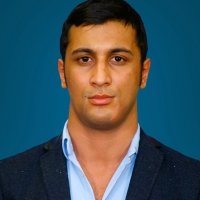
Anas El Gomati
Reverend Eugene Goussikindey
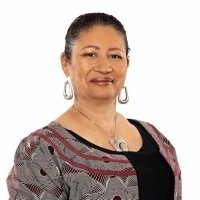
Cheryl Hendricks
Fr. Alain Nzadi-a-Nzadi
Moderator
Hosted By

Africa Program
The Africa Program works to address the most critical issues facing Africa and US-Africa relations, build mutually beneficial US-Africa relations, and enhance knowledge and understanding about Africa in the United States. The Program achieves its mission through in-depth research and analyses, public discussion, working groups, and briefings that bring together policymakers, practitioners, and subject matter experts to analyze and offer practical options for tackling key challenges in Africa and in US-Africa relations. Read more
Thank you for your interest in this event. Please send any feedback or questions to our Events staff.

